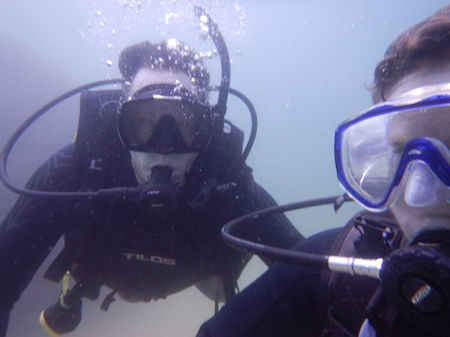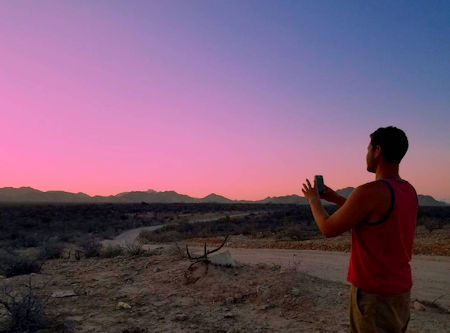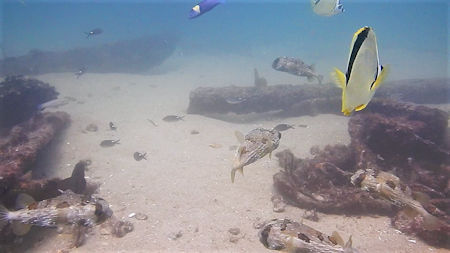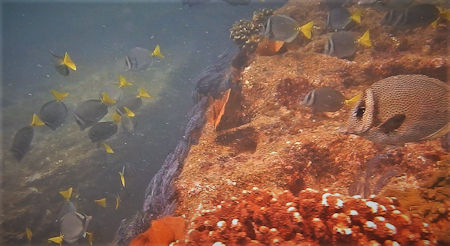 |  |
By Remy Sternbach

For Father’s Day weekend this past June, I took my dad down to Cabo Pulmo for a scuba diving expedition. Cabo Pulmo is in Baja California Sur, along the Sea of Cortez. It is one of the capes that make up the southernmost part of the Baja California Peninsula, which are collectively known as Los Cabos. When people usually think of this part of Mexico, they tend to think of Cabo San Lucas. You've probably heard of this famous tourist destination, which is best known for its club scene. The truth is the region has much more to offer than just partying! Cabo Pulmo specifically, is known to host one of the best scuba diving destinations in Mexico. In 1995, 7,111 hectares of the waters off Cabo Pulmo were converted into a national marine reserve. Strict limits on fishing were imposed by the Mexican government to encourage the revival of marine life. It worked. An estimated 400 to 500 percent of sea life has since returned to the area inside of the reserve, rendering incredible conditions for scuba diving.
If you have ever been to the region, you know that much of Los Cabos is desert with endless miles of cacti and twisted vegetation. It’s hard to conceive that in minutes you can go from such a dry barren place to stepping out into a wet and biodiverse tropical wonderland.

We stayed in the town of Cabo Pulmo itself, which is about 40 kilometers off Highway 1. Much of this leg is on a dirt road. At the time of writing, the town of Cabo Pulmo is incredibly small and spartan, you can literally walk across it in a matter of minutes. Inside the town, we stayed at the Cabo Pulmo Beach Resort, which is a PADI (Professional Association of Diving Instructors) 5-star dive resort. We stayed in a bungalow right by the water and enjoyed 2 days of diving with 2 dives each day. The resort provides complimentary dive gear, although you will still want to bring your own fins, mask, and snorkel.
The main attraction here is definitely the marine reserve. As a disclaimer, my father and I are new to diving. This was our first dive experience after receiving our PADI open-water scuba certification. In San Diego, where I got certified, the water is quite cold and you need to wear a thick neoprene hood to dive. Not to mention the surf and visibility conditions can be less than favorable. That said, it was quite a relief losing the hood and diving in the relatively balmy and calm Sea of Cortez. Diving the waters of Cabo Pulmo during June, the water temperatures get up to about 80 degrees Fahrenheit. Bath water! Also, for the duration of our trip to Cabo Pulmo, the visibility averaged at least 20ft.

Each morning we did a quick 2-minute trek to the main dive resort building from our bungalow. We would have a quick breakfast and then we met with other people elected to dive with us. As a group, we picked out what dive spots we wanted to go to collectively. We would then walk down to the water and boat out to the dive spot. All the dive spots were only within 10 minutes of one another, so despite the small size of the single engine boat, it did the trick just fine!
The first day of diving was Father’s Day and this was my and my Dad’s first time getting in the ocean since we got our diving certifications. That day, we explored a shipwreck. It probably was not what you would think of a shipwreck in the traditional sense, since the boat’s hull was mostly wood and has since rotted away. What was left was the engine and other bits and pieces of the boat. The decaying ship has helped harbor new life by acting as an artificial reef. Thus, we encountered a vast biodiversity of fish! In this tropical nirvana, some of the species we encountered included, Moorish idols, parrotfish, porcupinefish, triggerfish, needlefish, jackfish, yellow snapper, manta rays and even moray eels!

After our first day of dives, we drove down a dirt road about 15 minutes to Los Arbolitos Beach. There, we went snorkeling and saw even more fish and sea life! Los Arbolitos is also part of the Cabo Pulmo National Reserve. It’s a great opportunity to experience the reef when you aren’t diving or if you have yet to be scuba certified. Aside from the snorkeling, it’s a gorgeous and quiet beach. Due to it’s remoteness and “off-the-grid” feel, Los Arbolitos is great for anyone trying to get away and escape from Baja’s more crowded and touristy beaches.
Our second day of diving we explored several underwater canyons teeming with yet even more marine life. This was truly spectacular and immersive experience unlike any that I have had before. Being surrounded by sea life in all directions really makes you appreciate the beauty of this underwater landscape and the creatures that inhabit it. I even spotted a shark!
One thing to remember is that dive experience at Cabo Pulmo changes with the seasons. For example, in the fall, the visibility typically doubles and the water is near its warmest. At this time, harmless whale sharks migrate to this part of the Sea of Cortez and you can dive with them. You can take away from this that your dive experience will always be different every time you visit the waters of Cabo Pulmo. In general, this spot is a great opportunity for new and beginner divers. It’s relatively calm and shallow, considering the easy surf and none of the dive spots being deeper than 40ft. Divers new to the region should take note that the Sea of Cortez is somewhat more saline than the Pacific, so you will need to use a little more weight than usual to offset the added buoyancy. Oh… I recommend you take your Dad too!